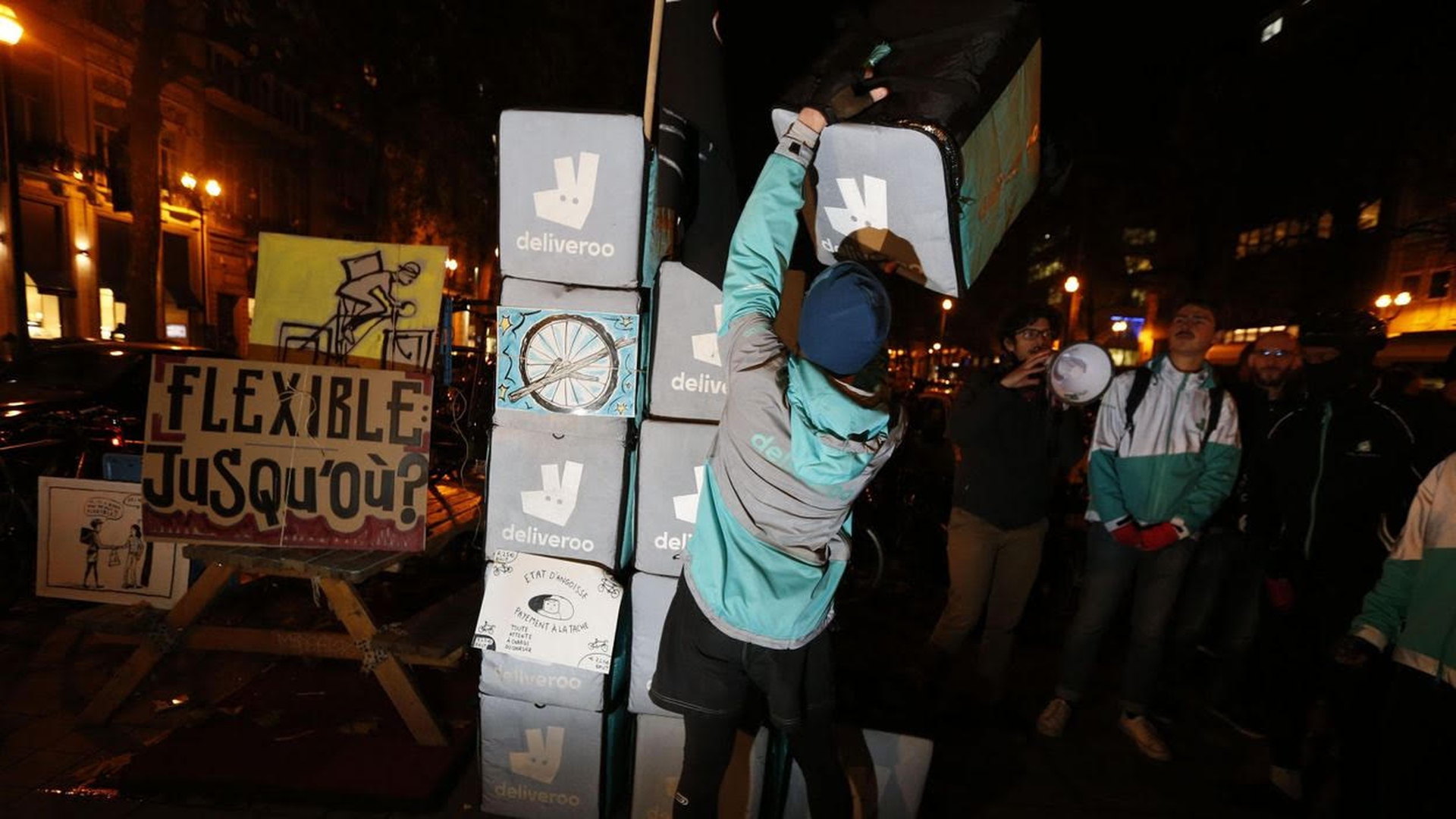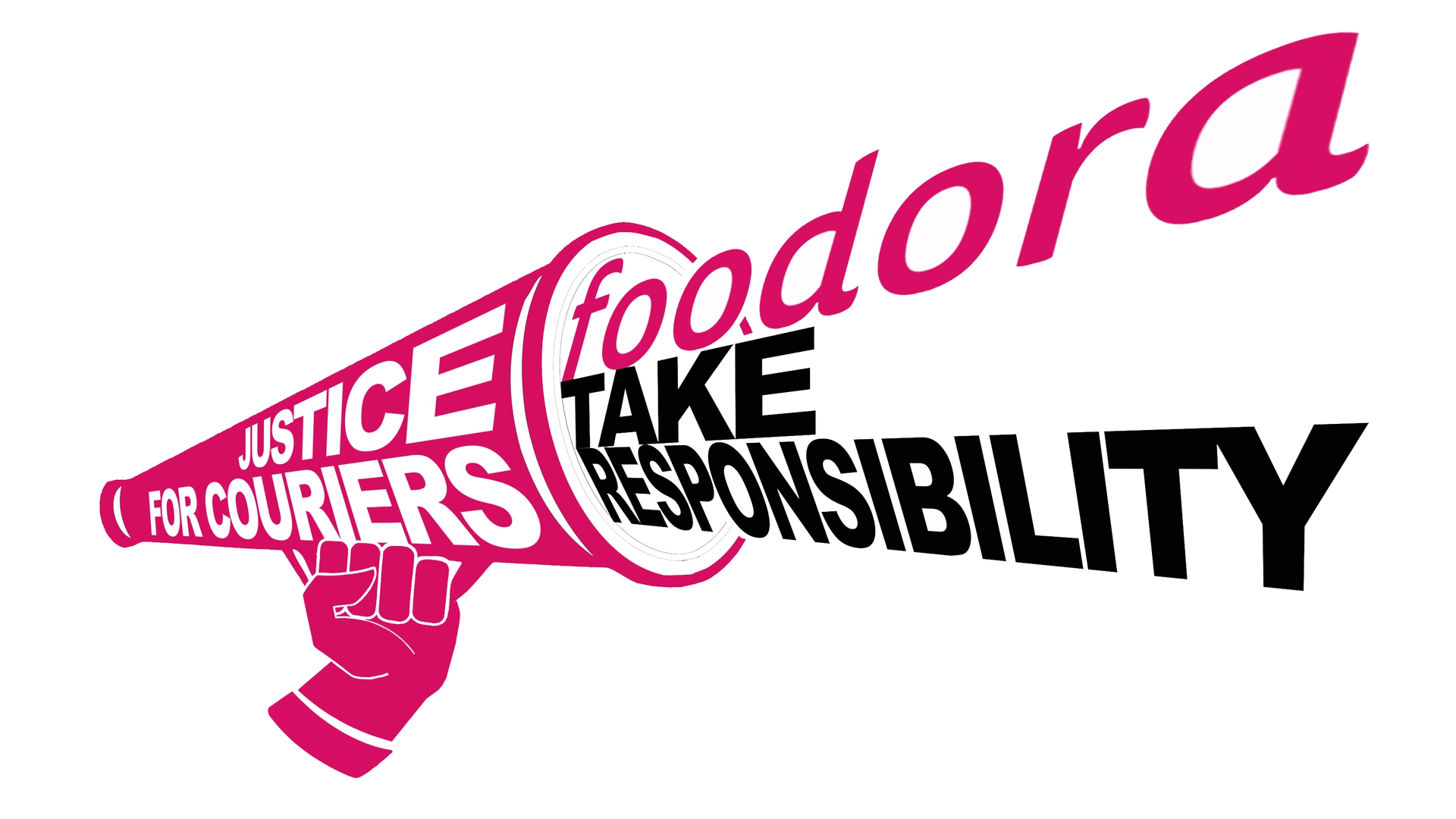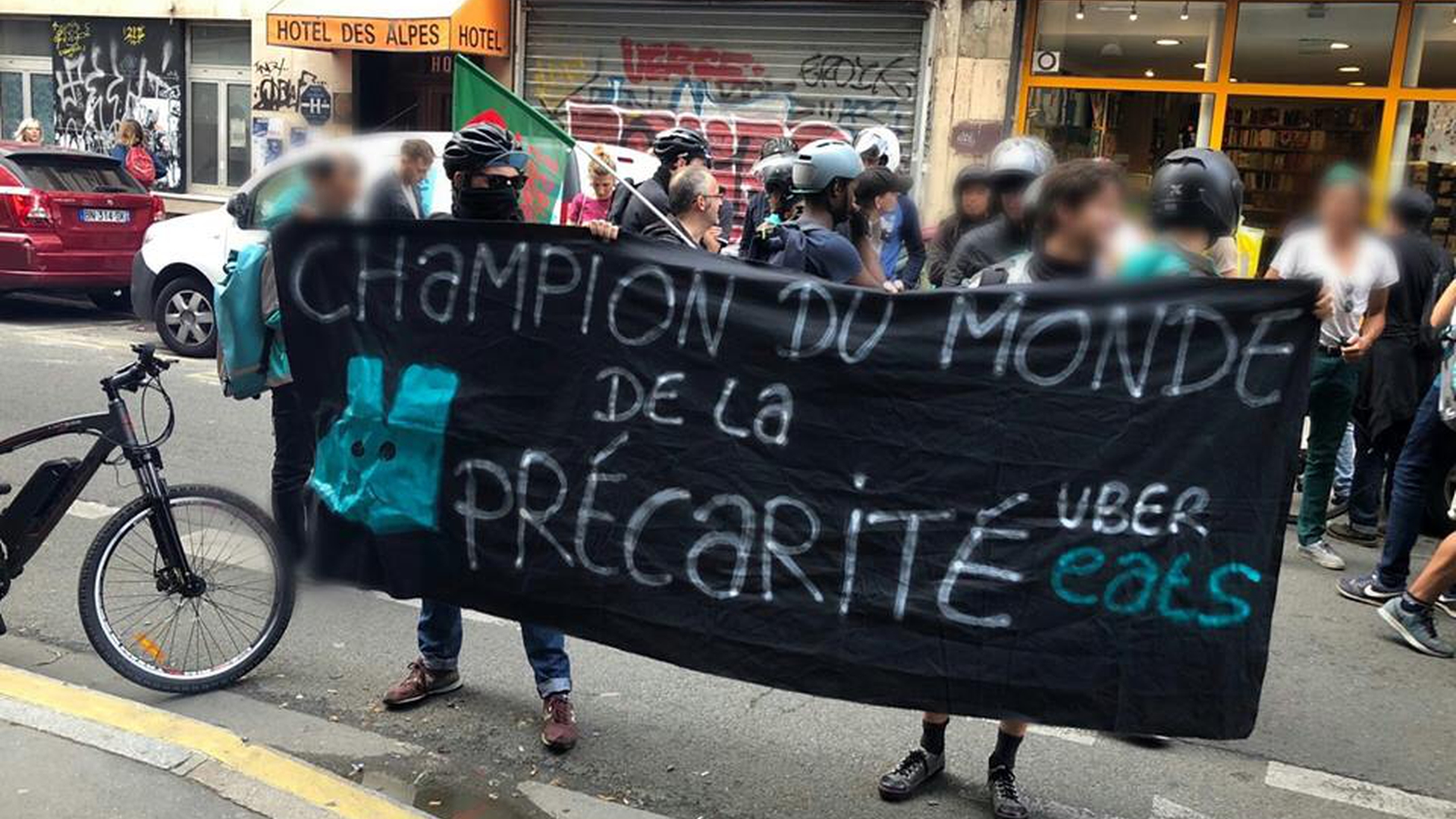#Slaveroo: An interview with Belgian riders
by
Kyle,
Callum Cant (@CallumCant1),
Douglas Sepulchre
October 31, 2018
Featured in The Transnational Courier Federation (#5)
‘It’s a job we have to start again - it never stops.’

inquiry
#Slaveroo: An interview with Belgian riders
by
Kyle,
Callum Cant,
Douglas Sepulchre
/
Oct. 31, 2018
in
The Transnational Courier Federation
(#5)
‘It’s a job we have to start again - it never stops.’
In October food platform workers from 12 states and 34 organisations met in Brussels for the founding meeting of the Transnational Federation of Couriers. This federation will represent platform workers across borders and lead a coordinated fight for better conditions in the sector. During the meeting, we interviewed a number of workers from across Europe to get a better understanding of the dynamics of the struggle.
Callum Cant, Notes from Below editor
Douglas Sepulchre is a member of the Brussels Collective de Coursiers who was fired by Deliveroo in early 2018
Kyle is a Deliveroo worker from Gent
How has the struggle gone in Belgium since August 2016?
I think that the most important struggle that we’ve had with the couriers was in Brussels. It happened between November 2017 and the end of January 2018. What happened is that we used to work with an agency contract, so we were not employed directly by Deliveroo but indirectly by an interim called SMART, a ‘co-operative’. Deliveroo decided to force us to all become independent contractors, with all the shit that entails, like being paid per drop not per hour and losing our social security rights. In November we organised our first demonstration. We had one objective, to be able to negotiate with Deliveroo and be recognised as the collective as an organisation that represents and defends the rights of the workforce.
What deliveroo used to say was, if you have any problems come and talk about it individually, we’re all in the same boat blah blah. Our goal was to say no, you have to discuss with representatives that are elected by the couriers. Eventually we managed to win that. Of course that was the first step, because we were not going to get anything with the first negotiations, that’s not how it works.
The first meeting between our representatives and Deliveroo was in December. They rejected all of our substantial claims. So, we went on strike a few times during January. We gathered a lot of people. The strikes started in brussels but then also spread to Liege, a city in the south. We had actually big strikes and were able to mobilise every time something like fifty couriers to go on strike. For Brussels that was very big.
How many couriers are there in Brussels?
Deliveroo said 3,000. But every time we went on strike we managed to block everything. In our union we organised all the people who worked full time for Deliveroo, all the people who would be invested in their job because it was their main income. So we had fifty people striking, but we had 300 members in the union. Deliveroo said they had 3,000 - but within that they had people who only worked one shift. Actually in terms of deliveries, we had the majority of deliveries organised. That was a great thing but at some point we understood we had found a limit. We had a nice idea - build a strike fund. That worked pretty well, we were able to give strike pay.
But at the same time the government created a new status, just between independent contractor and employee status that was just for all the shitty Uber, Deliveroo etc companies. At that point we had even the government against us. The strikes didn’t do anything, so we decided to do an occupation of their HQ. The occupation lasted 48 hours. At the end, we left on the condition that we would have a mediated negotiation with a representative of the minister of employment.
So you say occupation - what actually happened?
We came to the office. One person went in to ask some questions on the new status and all that. All the others, 20 people, were hiding round the corner. Then we all followed the first worker in and sat down. The boss decided to ask all the office employees to leave, except for one top manager who stayed with us for the whole 48 hours! We didn’t kidnap him, he stayed because he wanted to.
They called the police, but the police said that we were allowed to be there because we were working for Deliveroo, so it was a legal employee occupation - then Deliveroo said no, they’re independent workers, they’re not employees. So the police had to go to a judge and ask them to decide. But of course the judge didn’t want to make a fast choice because its a tricky question. So we stayed for 48 hours and it was totally legal. We only had some outsourced private security there, no police. But most of them worked for UberEats in their spare time! So we developed great contacts with them. After that we left because they accepted our demand for mediated negotiation.
But that didn’t work. Two days after we left we lost our struggle and were all forced to become independent or be fired. I was fired. But still, it was an incredible struggle, we achieved a lot and learned a lot. We showed we were all dispersed across the city but that anyway we could form one movement. Now what we need to handle is the question of turnover. Because all of the couriers we organised with then have gone and the new ones now don’t know the history of our struggle. It’s a job we have to start again - it never stops.
That’s a great example of the same dynamics that have happened all over the place - but we have no account of this struggle in English.
The French at one point were talking about their struggles, and they talked about their strikes in summer 2017. All of what we did was what they did before because we talked with them and learned from them. We copied their tactics for our strikes, we went round the city talking to the restaurants asking them to turn off their tablets. And I know if they did some strikes it was due to you guys in the UK who started everything. We do need to develop a common history of our struggles.
So what is the state of play in Belgium right now?
I am part of the socialist trade union, in the transport sector - BTB/UBT. For the moment I am the only one organised in that trade union, or a member of a trade union at all. I try and talk with my colleagues and I have some ideas to begin to organise something, an organisation of the riders in Gent. It’s very interesting to be here at the conference and listen to the stories and see how its done.
And you’re preparing to relaunch the struggle here in Brussels?
Yes. This conference is great because it’s organising internationally. Here in Belgium there is that shitty north/south relation.
A French/Flemish divide?
Yes. Brussels is technically French and Flemish (but 95% French) whereas Gent is Flemish.
So the strikes didn’t spread between the two?
Yes, it could be understood like that - our strikes spread to Liege, which is French. Maybe it’s even more complicated than that. But now actually we’ve met, and we can discuss how to organise across the gap.
We have also realised we now need to try harder to work with the UberEats workers. Our movement was really based around the cyclists, but it’s obviously important to organise the others too. They have an experience that is actually quite different, and in general they are a different group sociologically.
Are they migrant workers?
Yep
And they weren’t really involved first time round?
We had some, but actually we created our movement first around the courier community. You know, fixie people who love cycling. Within that community you have very precarious and non-white workers. But there are a lot more who work on mopeds. We should look towards these people.
That was clearly the limit of our movement - being only cyclists. That’s how we managed to create a community at first, that’s how you organise a movement - by talking about hobbies and shared interests with people was a way to start.
I think it’s worth saying that in the UK, our strikes only worked when the two groups worked together. On our own as cyclists it was hard - but when the mopeds decided to strike, shit kicked off. All of the big London strikes were led by militant migrant moped workers.
Featured in The Transnational Courier Federation (#5)
Subscribe to Notes from Below
Subscribe now to Notes from Below, and get our print issues sent to your front door three times a year. For every subscriber, we’re also able to print a load of free copies to hand out in workplaces, neighbourhoods, prisons and picket lines. Can you subscribe now and support us in spreading Marxist ideas in the workplace?


